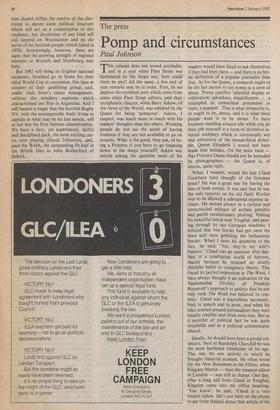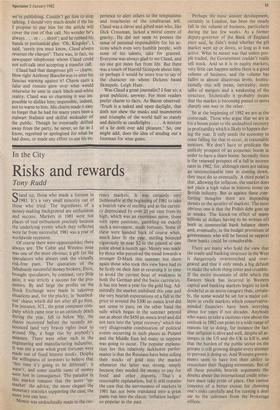The press
Pomp and circumstances
Paul Johnson
This column does not award accolades, and in a year when Fleet Street was dominated by the bingo war, how could there be any? All the same, a few end of year remarks may be in order. First, let me deplore the snobbish jeers which came from some other Fleet Street editors, and their sycophantic claques, when Barry Askew, of the News of the World, was rebuked by the Queen for being 'pompous'. Askew, I suspect, was much more in touch with his readers' thoughts than the others. Working people do not see the point of having footmen if they are not available to go on errands. What is the good, they ask, of be- ing a Princess if you have to go traipsing down to the shops yourself? Askew was merely asking the question most of his
readers would have liked to ask themselves if they had been there — and there is no bet- ter definition of a popular journalist than that. As for the Queen, a monarch ought to be the last person to use pomp as a term of abuse. Pomp signifies 'splendid display or celebration; splendour, magnificence . . . a triumphal or ceremonial procession or train; a pageant'. That is what monarchy is, or ought to be, about, and it is what most people want it to be about. To have footmen standing around idle while you do their job yourself is a form of defensive in- verted snobbery which is intrinsically wet and subversive of the monarchical princi- ple. Queen Elizabeth I would not have made that mistake. On the main issue that Princess Diana should not be hounded by photographers — the Queen is, of course, quite right.
What, I wonder, would the late Claud Cockburn have thought of the footman point? He was a great one for having the best of both worlds. It was said that he was the only reporter on the old Daily Worker ever to be allowed a substantial expense ac- count. He moved always in a curious and unreconciled mixture of archaic gentility and garish revolutionary plotting. Visiting his beautiful house near Youghal, and peer- ing through its vast Georgian windows, I noticed that two horses had got onto the lawn and were gobbling the herbaceous border. When I drew his attention to the fact, he said: 'Yes, they're my wife's hunters.' Claud was an innocent who dab- bled in a totalitarian world of horrors, mainly because he retained an utterly childlike belief in conspiracy theory. This found its perfect expression in The Week. 1 have always thought it an indication of the fundamental frivolity of Franklin Roosevelt's approach to politics that he not only took The Week but believed its con- tents. Claud was a marvellous raconteur, both in speech and in print, and when his tales centred around personalities they were usually credible and often even true. But as a recorder of political fact he was quite unreliable and as a political commentator absurd.
Ideally, he should have been a gossip col- umnist. Next to Randolph Churchill he was the most hardened telephoner of his age. This was his one activity to which he brought financial acumen. He often wrote for the New Statesman in the Fifties, when Kingsley Martin — then the meanest editor in London — was still in charge. One day, after a long call from Claud in Youghal, Kingsley came into my office beaming. 'You know', he said, 'Claud is a very foolish fellow. He's just been on the phone to me from Ireland about that article of his we're publishing. Couldn't get him to stop talking. I should very much doubt if the fee I propose to pay him for the article will cover the cost of that call. No wonder he's always . er . . . short'; and he rubbed his hands in puritanical glee. `Oh, Kingsley', I said, 'surely you must know, Claud always reverses the charges'. There was, in fact, no newspaper telephonist whom Claud could not soft-talk into accepting a transfer call.
Claud had that dangerous gift — charm. How right Anthony Blanche was to utter his famous warning against it! Charm casts a false and roseate glow over what would otherwise be seen in stark black-and-white reality. Claud was so charming it was im- possible to dislike him; impossible, indeed, not to warm to him. His charm made it easy to forget that he had for many years been a stalwart Stalinist and skilful misleader of the public. Though he eventually drifted away from the party, he never, so far as I know, regretted or apologised for what he had done, or made any effort to use his ex- perience to alert others to the temptations and treacheries of the totalitarian left. Claud was a clever and gifted man who, like Dick Crossman, lacked a moral centre of gravity. He did not seem to possess the sense of personal responsibility for his ac- tions which even very humble people, with none of his talents, take for granted. Everyone was always glad to see Claud, and no one got more fun from life. But there was a touch of Harold Skimpole about him; or perhaps it would be more true to say of the character on whom Dickens based Skimpole, Leigh Hunt.
Was Claud a great journalist? I fear so; a great publicist, anyway. For most readers prefer charm to facts. As Bacon observed: `Truth is a naked and open daylight, that doth not shew the masks and mummeries and triumphs of the world half so stately and daintily as candlelights . . . . A mixture of a lie doth ever add pleasure.' So, one might add, does the idea of sending out a footman for wine gums.



































 Previous page
Previous page